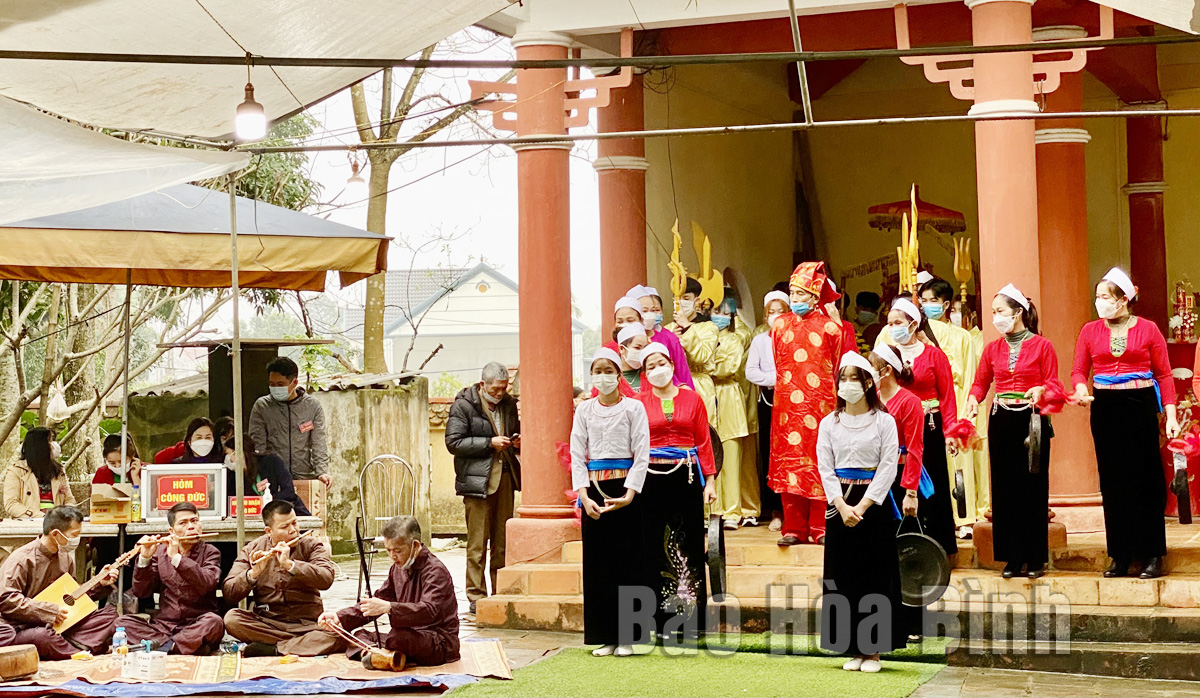
(HBO) - Tan Lac district is proud to be one of the cradles of the Muong ethnic people, which was previously known as Muong Bi. Over the past years, ethnic groups have raised their awareness of preserving and upholding cultural identity.
Muong ethnic musical instruments are indispensable cultural values
during Muong Bi (Tan Lac) summer festival.
Head of the district Culture-Information Office Dinh Son Tung said Muong Bi is
home to well-known relic sites such as Trang waterfall, Cot Co mountain in Nhan
My commune, Nam Son and Nui Kien caverns in Van Son commune, and Hoa Tien and
Thac Bo caverns and Bung cave in Suoi Hoa commune. Traditional craft products
like brocades and can (pipe) wine, together with folk songs and Muong gong
performances, have enriched local spiritual lives, contributing to popularising
the image of Muong land and its people.
Recent statistics showed that the district is now home to 87,565 people, 85
percent of them of the Muong ethnic group. Over 2,200 Muong gongs, 579 folk
musical instruments and about 4,800 Muong ethnic costumes are being kept. Among
the 11 recognised relic sites, six are at the national level and five at
the provincial one. The district checked the status of 60 relic sites and
classified them to add into the list of relics under the management of the
province.
Secretary of the district Party Committee Dinh Anh Tuan affirmed that
developing culture, preserving and upholding cultural identity are both
the goal and the driving force for socio-economic management and national
defence-security. In particular, in order to create highlights in local tourism
development, the district raised public awareness of the effort from the
grassroots level, especially in each family and residential area. It pooled
resources and focused investment in humans and outstanding cultural values,
with incentives given to collectors, researchers and keepers of the traditional
cultural identity. The district also combined the socio-economic development
with the preservation of ethnic cultural identity and enhanced State investment
in the effort, especially in remote and mountainous areas./.
The People’s Committee of Lac Son district held a ceremony on April 28 to receive the provincial relic certificate for the ancient rock carving site at Suoi Co stream, located in My Thanh commune.
A special music show titled "The country is in the fullness of joy” has been held at Hoa Binh Square in Hoa Binh city in celebration of the 50th anniversary of the liberation of the South and national reunification (April 30, 1975–2025).
The People's Committee of Lo Son commune, Tan Lac district, has organised the local annual traditional stream fishing festival on April 19 - 20.
As a land deeply intertwined with human history and Vietnam’s millennia-long journey of nation-building and defence, Hoa Binh is often revered for its epic tales and legends.
Residents of Hoa Binh boast a rich cultural identity, reflected in their unique language, traditional attire, customs, and folk melodies – described as "sweet as honey, clear as a mountain stream.”
Lac Son district’s Vu ban town held the 2025 Truong Kha temple festival on April 12–13 (the 15th–16th days of the third lunar month). Since its revival in 2019, the festival has been organised every three years, preserving valuable intangible heritage while meeting the community’s cultural and spiritual needs.



